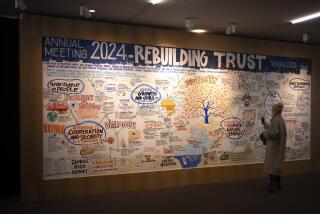Building on hope
THE YEAR 2005 WILL GO DOWN as a turning point in the global war on poverty, a struggle no less urgent than the war on terror.
Africa, a continent often relegated to the furthest recesses of our consciousness, came closer to occupying center stage this year, thanks to efforts by the likes of Bono, the humanitarian/rocker aptly named one of three persons of the year (along with his benefactors, Bill and Melinda Gates) by Time magazine. Bono, who has a knack for building improbable coalitions with Christian evangelicals also concerned about the plight of Africa, helped galvanize a movement that pressured the Group of 8 industrialized nations to double annual aid to Africa to $50 billion by 2010, and to forgive about $40 billion more in debt from some of the worldŌĆÖs poorest countries.
Although there are plenty of reasons for disappointment -- most notably the lack of progress in the Doha round of trade talks -- there are reasons to be hopeful that the worldŌĆÖs attitude toward poverty has evolved: ItŌĆÖs no longer hopeless, or somebody elseŌĆÖs problem.
For decades during the Cold War, the Western world for the most part regarded impoverished nations as chess pieces in the struggle against communism. If foreign aid was doled out, it was mostly to prop up friendly dictatorships that could be counted upon to crush leftist insurrections. Nobody much cared if the aid disappeared down a sinkhole of corruption; helping people out of poverty wasnŌĆÖt the point. The inevitable result was cynicism about the effectiveness and purpose of international development. By the early ŌĆś90s, with the Cold War over and billions in aid squandered, it seemed like a pointless waste of taxpayer money.
Around the turn of the millennium, that changed. The United Nations and other groups set concrete goals to slash poverty and disease within 10 to 15 years, and wealthy countries committed to making them a reality. The progress after that was steady but slow. Five years later, it became clear that none of the goals were going to be met; making promises was one thing, living up to them by spending real money was another. Spurred on by activists like Bono and Bob Geldof, philanthropists like the Gateses and world leaders like British Prime Minister Tony Blair, wealthy nations took a deep breath and opened their pocketbooks in 2005.
Unfortunately, that doesnŌĆÖt mean we can rest on our laurels. If one message came through loud and clear this year, it was that the problems of poor countries, particularly in Africa, are intractable and widespread, and it will take an enormous amount of resources to solve them.
Especially disappointing was the failure by the World Trade Organization to make much progress in opening markets and reducing subsidies for agricultural goods, a critical step toward raising living standards in the Third World. Bizarrely, leaders of industrialized nations would rather give away money than free up their markets, which would boost their own economies as well as those of their trading partners. A better trade deal must be put at the top of the worldŌĆÖs agenda in the coming year.
More to Read
Sign up for Essential California
The most important California stories and recommendations in your inbox every morning.
You may occasionally receive promotional content from the Los Angeles Times.










